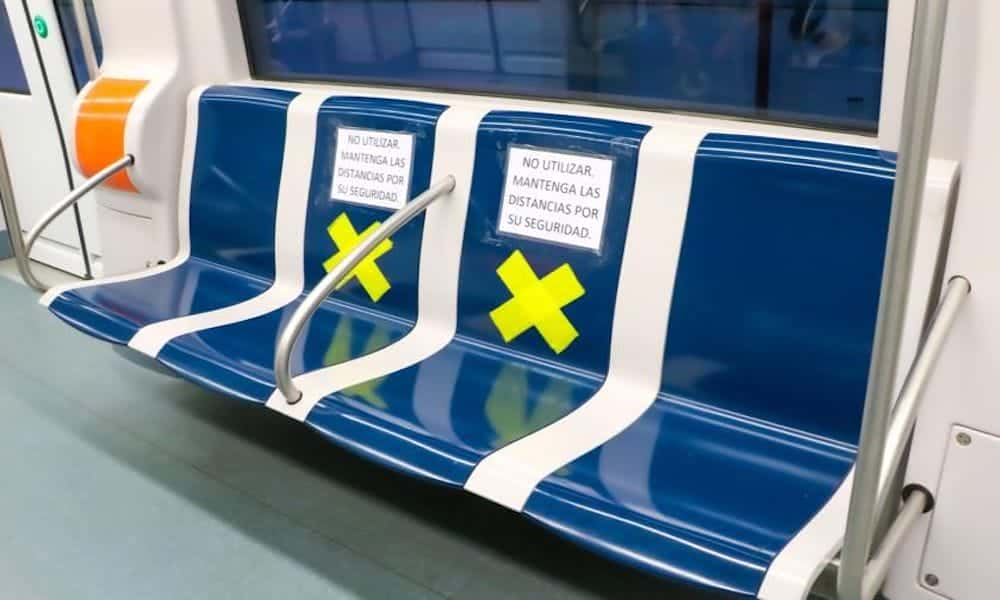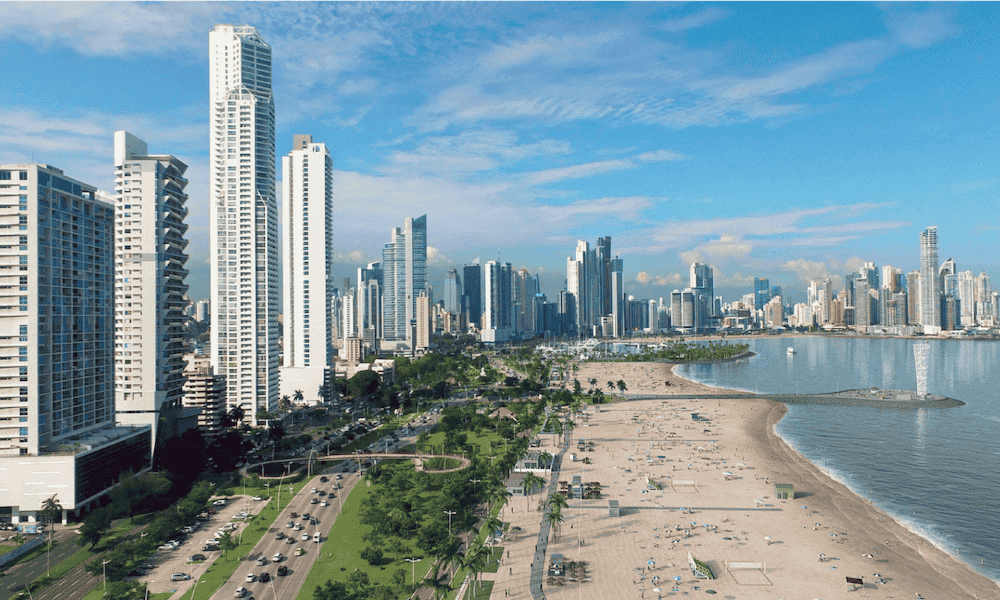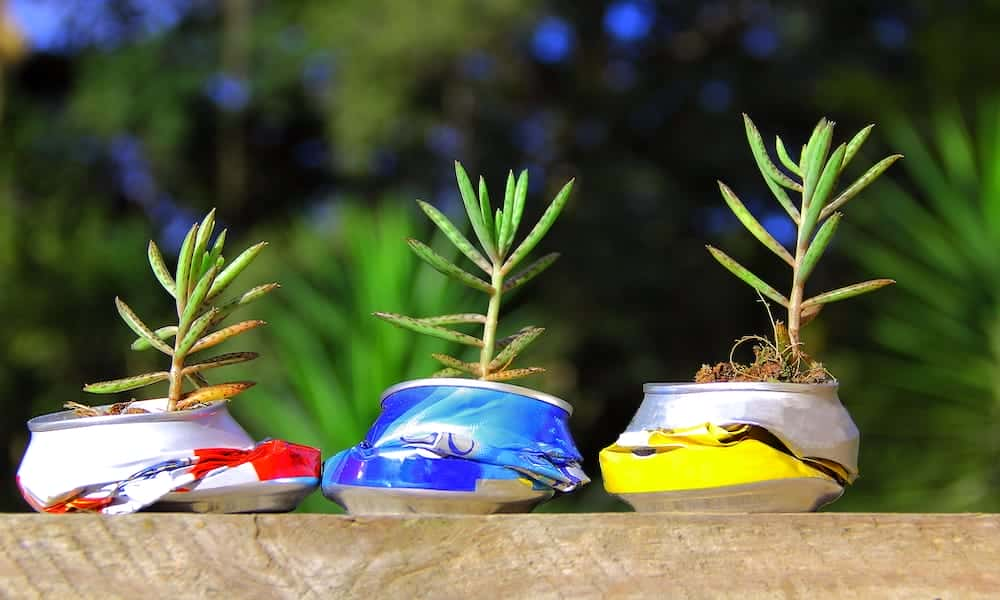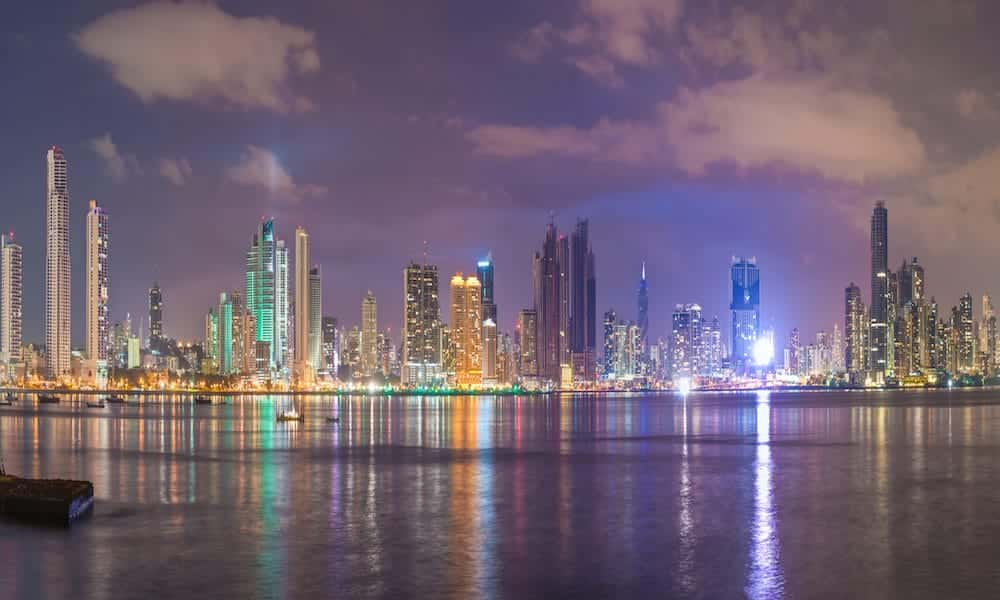- Our Offer
- Your investment opportunities
- Plan B & Emigrate
- News
- Panama
- Team
- Contact


Category: Life in Panama
Corona virus in Panama / update 29 October 2020
The streets of Panama City are noisy again, which is a good indicator for the recovering economy of Panama. The international airport has been reopened for tourism, all economic sectors are on the rise and the spirit among the population has improved. This is due to the extensive opening after the months-long lockdown in Panama and the improving corona figures. The second corona wave is declining and a German vaccine is already being tested on first patients in Panama.
Health (figures as of 27 October 2020)
- There are currently 130.422 cases and 2.650 deaths.
- The R-value is 0.92 and has fallen continuously in recent weeks.
- The mortality rate is 2.0% (global average 2,7%).
- Currently, 80% of the test capacity of Germany is performed per capita.
- The percentage of positive tests has fallen from 35% (July) to currently about 10%.
- The intensive care beds have never been fully occupied.
- Curevac from Germany is testing its corona vaccine in Panama.
- The graph shows the weekly development of new infections and the test positive rate (curve). The strong increase in June began with the opening of the first economic sectors.
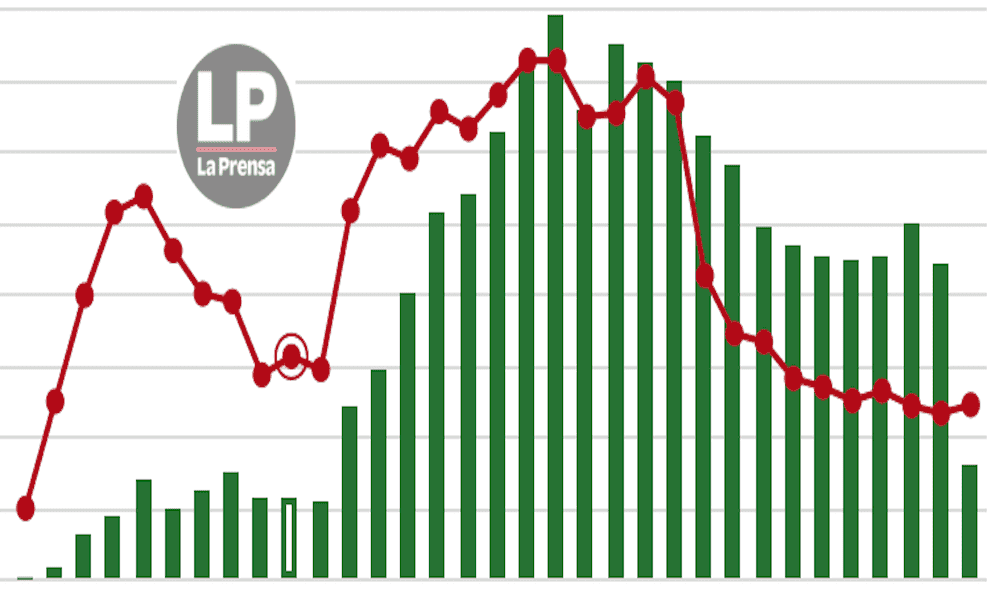
Economy
- All economic sectors are reopened.
- Consumer confidence is rising, as shown by a survey of the chambers of commerce.
- According to the government there will be no tax increases due to the Corona pandemic. This distinguishes Panama from many neighboring countries where many millionaires leave their homes to move to locations like Panama and protect their assets (info link to the Bloomberg report). New investor visas are offered for this purpose.
- The Panama Canal ended its fiscal year (September 30) with a 1.2% increase in turnover compared to the previous year. For the new fiscal year, a decrease in sales of 10% is expected. The better than expected developing economies of the USA and China give hope for a faster recovery. Thanks to water saving measures and rainfall, the canal has reached its highest water level again.
- A new multi-billion-dollar water project on the Panama Canal, the construction of the Metro Line 3 and four other major investment projects for public works are expected to boost the economy again.
- The copper mine, one of the largest worldwide, is running at full production (info link).
- According to the World Bank, Panama’s economy will shrink by 8.1% in 2020 and recover by 5.3% in 2021. In 2020, unemployment may rise up to 20 – 25% in the short term (in 2019: 7%).
Life in Panama
- Currently there is only a curfew from 11.00pm – 05.00am.
Travel to Panama
- Since 12.10. the international airport of Panama City is open again.
- 80 flights to 36 cities and 20 countries are operated daily.
- Travellers must present a corona negative test (max. 48 hours old) or can take a quick test (results after 20-30min) for 50 USD directly at the airport in Panama. If this test is positive, the person will be quarantined in Panama.
- According to current surveys (125 hotels) 36% of the hotels will reopen in October and another 32% by the end of the year. The rest would like to reopen in the new year and 1 hotel will close permanently.
FRAPAN-Invest
Klaus Happ’s company “FRAPAN-Invest” advises investors who want to invest in real estate in Panama. Furthermore, Klaus Happ will be happy to advise you personally on the subject of “Plan B in Panama”.
The real estate market in Panama is internationally one of the most interesting for investments. We would like to be your trusted local partner and assist you with the initial purchase. Additionally, we can take care of your real estate in Panama in a sustainable way.
Profitable, safe and beautiful:
Investments in Panama
Corona virus in Panama / update 26 August 2020
In June I reported that the Panamanian government had started to lift the very strict corona rules in force since March. Now there seems to be light at the end of the long corona tunnel, as infection rates in Panama have been improving for several weeks and both the economy and private life are experiencing reopenings and relaxation. Travel to Panama is also becoming possible again. More about the positive news, but also about the negative influence of the Corona Virus on Panama in the following.
Health (figures as of 25.08.2020)
- There are currently 88,381 cases and 1,919 deaths.
- The R-value is 0.94 and has fallen continuously in recent weeks.
- The mortality rate is 2.2% (global average 3.5%).
- On the American continent, Panama continues to be one of the countries where most tests are performed per capita. This also explains the high number of Corona cases.
- While in the first half of August the percentage of positive tests was still between 30-40%, this figure has fallen to 16-20% in the last few days.
- The intensive care beds are not being fully occupied.
- The following chart shows the development of active Corona cases. The strong increase in June / July started with the opening of the first economic sectors.
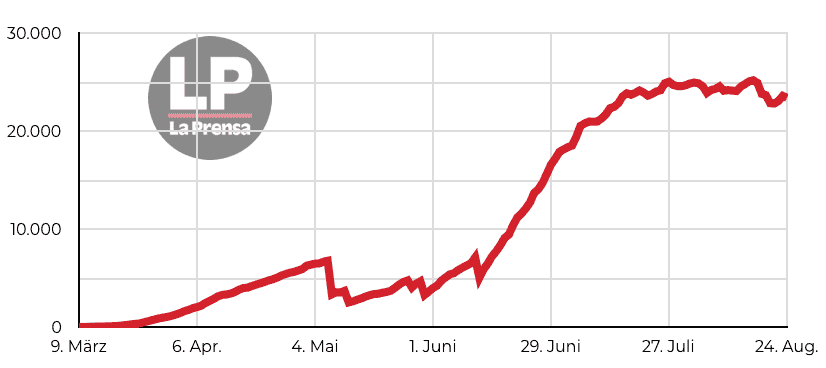
Economy
- In the last few weeks, various economic sectors have already been allowed to reopen (real estate companies, various construction projects, wholesale trade, NGOs, car dealerships, hairdressers, etc.)
- Yesterday it was announced that the following sectors will be allowed to open in the next few weeks: Complete construction sector, free trade zones, marinas, tailor shops, etc. (all from 07 September) / Professional sports leagues without spectators (from 21 September) / Retail trade, restaurant visits, still closed services (all from 28 September) / Tourism, libraries (all from 12.October).
- No opening date defined yet: presence in schools and universities, gym, theatre, cinema, bars and discos.
- The construction of the metro line 3 should start at the beginning of the new year.
- This is an investment of more than 2.5 billion dollars, which will create more than five thousand jobs during its construction phase.
- Four other major public works investment projects worth $130 million will be tendered shortly.
- The Canal Authority has approved a $2 billion programme to secure water resources and boost the economy in Corona times.
- There are signs of a recovery in world trade along the Panama Canal. Container traffic between the USA and Asia, the canal’s main route, increased in August. In the worst-case scenarios, the COVID 19 pandemic is expected to cause a 20% drop in sales (in May and June it was about -10% / positive record figures were reported before). The budget for 2020-2021 provides for revenues of USD 3.3 billion and a transfer of USD 1.8 billion to the Panamanian government treasury.
- The Panamanian copper mine may now gradually resume full production after the corona-related closure. The mine is operated by the Canadian company “First Quantum Mining” and is one of the largest copper mines worldwide. Last year the mine went into operation for the first time (info link).
- The National Bank of Panama has issued a USD 1 billion bond at 2.5% over 10 years. The demand was 4.8 billion USD. In addition, Panama has received a loan of 400 million USD from the IDB (Inter-American Development Bank) to combat the consequences of the pandemic.
- The most important emergency aid is preferential loans for small and medium-sized enterprises guaranteed by the government.
- Panama’s USD economy has grown at an average rate of 6-8% p.a. since 2002. Similar growth is not found in the western world. However, the corona crisis will leave deep wounds in the economy, which is accustomed to success.
- The service sector accounts for about 70% of Panama’s economy. In this context, Panama is particularly hard hit by the lockdown in force since mid-March in two important sectors: tourism and aviation (no international passenger flights in the lockdown). And this as an air traffic hub of Latin America. The construction sector, which accounts for approx. 18% of Panama’s economic output, was completely closed for a long time, but is now open again and should be stimulated by the infrastructure projects mentioned above. According to a recent survey, about 40% of all businesses were temporarily or permanently closed. Given this background, the government expects a temporary unemployment rate of up to 20% for 2020 (in 2019 still 7%). This will lead to a decline in Panama’s economy of 9 – 10% in 2020. Analysts expect a significant recovery of the economy in 2021 – and therefore increasing revenues for the government.
- According to analysts the risk of government debt overload is low. One reason is that Panama has a low level of government debt (41.3% of GDP in 2019). Secondly, unlike many emerging markets, the country is not subject to exchange rate volatility as the USD is used as the national currency.
Life in Panama
- After the strict curfew for 8 of Panama’s 10 provinces (except for Panama City and the neighbouring province) were already relaxed in June, there is now a return to “new normality” nationwide. From 14 September, there will only be an exit restriction from 11 p.m. to 5 a.m. and on Sundays. From 12 October no restrictions at all.
- Like everywhere else in the world, people in Panama demonstrated against the hard lockdown measures and the resulting economic consequences in the last few weeks.
- In Panama there is not only prosperity and economic growth, but also areas with poorer populations. For these people the lockdown, also the “not being able to work” is especially hard, because they depend on their daily income. These population classes are supported by monthly corona benefits from the government.
Travel to Panama
- Nationals and residents have been allowed to enter and leave the country again by plane since 07 August.
- In addition, Copa Airline is now able to offer flights to 8 different countries (besides the USA there are other countries in Latin America).
- From 28 September domestic flights are possible again.
- On 12 October, international tourism is to be reopened and thus the international airport will be completely opened.
FRAPAN-Invest
Klaus Happ’s company “FRAPAN-Invest” advises investors who want to invest in real estate in Panama. Furthermore, Klaus Happ will be happy to advise you personally on the subject of “Plan B in Panama”.
The real estate market in Panama is internationally one of the most interesting for investments. We would like to be your trusted local partner and assist you with the initial purchase. Additionally, we can take care of your real estate in Panama in a sustainable way.
Profitable, safe and beautiful:
Investments in Panama
Corona Virus in Panama / Update 25 June 2020
Here you will find the latest information on the Corona Virus in Panama (figures as of June 24, 2020):
- There are currently 28,030 cases and 547 deaths.
- Mortality rate is 1.95% (global average 5.15%).
- Number of tests performed per day has tripled in the last few weeks. This makes Panama one of the countries on the American continent where most tests are performed per capita. Meanwhile, “door-to-door” testing is being carried out in more affected areas.
- The strict quarantine guidelines for the 10 provinces of Panama have been significantly relaxed due to the better case numbers. However, in two provinces of Panama (including Panama City) so-called “clusters” have formed in a few districts (mostly densely populated by poorer population). This has led to the two provinces falling back into the strict quarantine guidelines. Here of course the displeasure of the population and entrepreneurs in the two affected provinces is growing after meanwhile 3 months of restrictions.
- These two provinces account for 85% of the new corona cases in the whole country. In some other provinces there are no more new corona cases at all.
- The sectors of Panama’s economy have been divided into six blocks, according to which their reopening is regulated (Overview of the mentioned economic blocs). Block 1 and 2 are open. Block 3 is now opened at different times from province to province, depending on the number of corona cases. In addition to the Panama Canal, banks, lawyers and, as of Monday, tax consultants and accountants will also be working. In general, the main restriction is that companies are only allowed to work at a capacity of 25%. In addition, they must observe strict hygiene guidelines issued by the Ministry of Health.
- The international passenger airport in Panama City is closed until 23.07.2020.
FRAPAN-Invest
Klaus Happ’s company “FRAPAN-Invest” advises investors who want to invest in real estate in Panama. Furthermore, Klaus Happ will be happy to advise you personally on the subject of “Plan B in Panama”.
The real estate market in Panama is internationally one of the most interesting for investments. We would like to be your trusted local partner and assist you with the initial purchase. Additionally, we can take care of your real estate in Panama in a sustainable way.
Profitable, safe and beautiful:
Investments in Panama
Corona virus in Panama / update 25 April 2020
The corona virus in Panama has not yet overloaded the health system and the new hospital was opened a few days ago after only 28 days of construction. 300 construction workers have been involved and it has cost 6.5 million USD. The rating agency Moodys predicts that Panama will be the richest country in Latin America after Corona from 2021 (purchasing power per capita / more on this below). The goal of the small country is to become a role model in crisis management within the region and to fulfil its role as the “Hub of the Americas” and to further develop this role.
Here you will find the latest information on the Corona Virus in Panama.
Health (figures as at 23 April)
- There are currently 5,166 cases and 146 deaths.
- Doubling of cases every 19 days (Germany 54 days).
- R0 reproduction rate is at 0.95% (similar to Germany).
- Mortality rate is 2.9% (similar to Germany).
- Panama has performed the third most corona tests per capita in the Americas after Canada and Chile.
- The number of intensive care beds should be increased to 25 per 100,000 inhabitants (approx. 45 in Germany).
- There are car “drive-through” test stations.
- Thermal cameras are installed at the metro stations to detect possible fever in people.
- From Panama, the International Red Cross and the United Nations organize their aid deliveries for the other countries of Latin America.
- The logistical importance of Panama as the “Hub of the Americas“, from which Panama profits in “normal” times, has brought disadvantages in Corona times. At the beginning of the corona crisis, many international businessmen and tourists travelled the country and introduced the virus.
Economy
- First Quantum Mining’s Panama Copper Mine has temporarily suspended 7,000 work contracts as the mine was closed due to several corona falls. The mine was opened last year and is expected to represent 3-5% of Panama’s GDP when fully operational (info link).
- The Panama Canal exceeded its revenue forecasts in the 1st half of the fiscal year (Oct-March). The second half of the year will be significantly worse due to weaker world trade. Panama as a maritime services and logistics country offers its shipping customers payment deferrals and discounts on the use of seaports and other services. With the aim of ensuring that they continue to use Panama as a maritime location even in the current crisis.
- The rating agency Moodys leaves Panama’s rating at investment grade Baa1 with stable outlook despite the corona crisis. According to Moodys, Panama benefits from its sustained economic growth, the global importance of the Panama Canal and the country’s logistical location. According to Moodys, these are also the reasons why Panama will be the richest in Latin America from 2021.
- Nevertheless, the slowdown in world trade will have a major negative impact on economic growth in 2020 and lead to a weakening of debt ratios. Panama’s average real gross domestic product (GDP) growth for the years 2010-2019 was 6.2%. Moody’s estimates that the coronavirus pandemic will shrink the Panamanian economy by 1% in 2020.
- The World Bank currently estimates that the GDP of Latin American countries will contract by 4.6% on average in 2020. The economies of Panama (-2%), Colombia (-2%) and Paraguay (-1.2%) would be least affected. Brazil (-5%), Argentina (-5.2%) and Mexico (-6%) would be hit hardest. In 2021, Panama’s economy is expected to grow again at 4.2%.
- Workers employed in the “informal” sector are particularly hard hit by the crisis in Panama. These are “micro self-employed” who work without contracts and insurance. There are many of them.
- On 26 March, a government bond (36 years maturity / triple oversubscribed) was successfully issued and 2.5 billion USD were collected.
Life
- Tocumen airport should be opened to international passenger air traffic from 23 May.
- The curfew will remain in force until May 6 and the first relaxation is expected in 14 days. Currently, it is assumed that the opening of the economy and the curfew will be different in the provinces (federal states), as the above-mentioned health indicators differ.
- Panama was the first country in the region to introduce curfew controls and even separate them by gender (to reduce the number of people on the streets). Peru, Colombia and other countries have followed suit.
- Those who violate measures are threatened with a 3-month driving license suspension and social work (including cleaning buildings and streets).
- The population is very united behind the measures of the government and the situation is calm and peaceful. However, there have also been food thefts and occasional robberies at kiosks.
Main contents of the speech to the nation by the president on 22.04.:
- President Nito Cortizo and his team of advisors are guided by the best practices of other countries that are successful in containing the virus and opening up their economies. Germany is regarded as one of the role models here because of its robust healthcare system.
- He explained that tax revenues are currently falling due to the crisis (minus 42% in March). Private auditors of international repute will join the government team to analyse the country’s spending in connection with this pandemic.
- So far, about half a million food parcels and shopping vouchers have been distributed to vulnerable families.
- President Cortizo was deeply angered that government officials have accepted these aid packages even though they are fully employed. He is giving these workers 48 hours to voluntarily donate 20% of their salary for the next three months, otherwise he will take action against them.
- He also explained that the banking sector in Panama is extremely important because 27,000 Panamanians are employed there and funds are managed for local and international clients. All strategic decisions of the government that affect this sector must be analyzed very carefully.
- The country’s economic advisors have developed a strategic plan to create jobs through public infrastructure projects. These include the fourth bridge over the Panama Canal, the third metro line and the new children’s hospital.
- The President is optimistic that the country’s economic recovery will be sustainable. He has full confidence in Panama’s Minister of Economy and Finance, Héctor Alexander, a veteran politician who played a key role in restoring the country’s economy in the years following the 1989 US invasion.
FRAPAN-Invest
Klaus Happ’s company “FRAPAN-Invest” advises investors who want to invest in real estate in Panama. Furthermore, Klaus Happ will be happy to advise you personally on the subject of “Plan B in Panama”.
The real estate market in Panama is internationally one of the most interesting for investments. We would like to be your trusted local partner and assist you with the initial purchase. Additionally, we can take care of your real estate in Panama in a sustainable way.
Profitable, safe and beautiful:
Investments in Panama
Corona virus in Panama / update 30 March 2020
The corona virus has arrived in Panama and there are currently 989 cases and 24 deaths (as of 29 March 2020). The Panamanian government has taken strict measures very early in order to control the virus spread. This is to prevent the stress on the health system, which is of course not as stable in a country like Panama as in Germany. Panama has a very young population (average age 26 years / Germany 44 years), which hopefully will help to keep the mortality rate low. The United Nations praised Panama’s measures from the beginning as a model for Latin America (Info-Link).
Here is an overview of the measures:
- Within 30 days a new hospital for corona patients will be built (module construction system, which allows to use it in other places in the future).
- Since 25.March there is a curfew throughout the country. People are only allowed to leave their homes for two hours a day to do their shopping. Who thinks that Panama does not get this organized is wrong. The end number of the identity card of everybody in Panama determines on which two hours a day this has to happen. This automatically avoids overcrowding in supermarkets, pharmacies, etc. and the meeting of many people. Pensioners have their own time of day when they can do their shopping in peace.
- The streets are controlled and non-compliance is sanctioned.
- Exceptions are professionals at the Panama Canal, in banks, in some authorities and of course in hospitals and other security related institutions. Otherwise, work is done via home office.
- All international passenger flights are suspended until 22. April.
- China has donated 5,000 corona tests and other medical equipment to Panama.
- The government is using 2,000 hotel rooms in Panama City (including the Hard Rock Hotel) to isolate corona patients who have tested positive.
- The government distributes 30,000 shopping vouchers to socially weak families worth USD 1.5 million. In addition, thousands of food packages are given away every day.
- Electricity prices are reduced by 30% – 50% and credit payments can be delayed.
Panama has responded very quickly to the new situation, but we have to wait and see how it develops and how the measures work, as is the case all over the world.
The measures taken will have a negative impact on the economy in Panama, as everywhere else in the world. The tourism sector (the main season is fortunately almost over) including the cruise sector and the gastronomy sector are particularly suffering.
The service sector represents about 70% of the Panamanian economy. The main service sectors are logistics, trade, finance and tourism. Thanks to the Panama Canal, the country generates annual revenues between 2 – 2.5 billion USD, which is a lot for a country with 4.2 million inhabitants. Accordingly, great importance is currently attached to the Panama Canal and the seaports functioning as usual, as approximately 6% of world trade flows through the Canal. Currently, many corona supply measures of Latin American countries are organized from Panama (“Hub of the Americas”). The Panama Canal will help to stabilize government revenues. Even if these stable Panama Canal revenues will be lower than normal in the current difficult times. The canal is a windfall for the small country.
The construction sector in Panama is another important component. Currently, construction in Panama is at a standstill due to the corona measures. The “reactivation of the construction sector” with the large infrastructure projects (third metro line, fourth bridge over the Panama Canal, new copper mine) will give Panama’s economy a boost again. Let us hope that we will return to normality in Panama as quickly as possible, as in the whole world.
FRAPAN-Invest
Klaus Happ’s company “FRAPAN-Invest” advises investors who want to invest in real estate in Panama. Furthermore, Klaus Happ will be happy to advise you personally on the subject of “Plan B in Panama”.
The real estate market in Panama is internationally one of the most interesting for investments. We would like to be your trusted local partner and assist you with the initial purchase. Additionally, we can take care of your real estate in Panama in a sustainable way.
Profitable, safe and beautiful:
Investments in Panama
Beach for Panama City
In recent days, the new mayor of Panama City has presented the 120 million USD plan for Panama City to have its own city beach. Following the example of Rio de Janeiro and Barcelona, a large beach with various other leisure attractions is to be built directly on the city’s promenade over the next few years.
Until the 1960s, the citizens of Panama City had their city beach, which was lost in the following years in the city and population development.
According to the Smithsonian Institute, the plan is feasible since there have been major efforts and projects since 2006 to improve water quality in the Bay of Panama City. The greatest challenge is to continue improving the city’s sanitation situation. Such a prestigious project naturally also offers many opportunities for international companies interested in participating in this project.
On the title photo you can see a visionary picture, how such a city beach could look like and on the following photo how attractive Panama City looks already now.
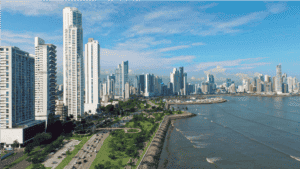
If this project really is successful, it would significantly upgrade the attractiveness of Panama City as a real estate location.
FRAPAN-Invest
Klaus Happ’s company “FRAPAN-Invest” advises investors who want to invest in real estate in Panama. Furthermore, Klaus Happ will be happy to advise you personally on the subject of “Plan B in Panama”.
The real estate market in Panama is internationally one of the most interesting for investments. We would like to be your trusted local partner and assist you with the initial purchase. Additionally, we can take care of your real estate in Panama in a sustainable way.
Profitable, safe and beautiful:
Investments in Panama
Ban of plastic bags in Panama
With the immediate ban of plastic bags Panama makes a big step forward in the protection of the environment. This makes Panama the first country in Central America to ban plastic bags.
In Panama there is currently no functioning recycling system in place, which unfortunately means that household waste ends up in large landfills. Here you can see waste children commissioned by companies who try to select “valuable” garbage and then hand it over to creative companies for pocket money. The recyclables are then cleaned, sorted and shipped to industrialized countries in order to be sold there for a lucrative fee. In the middle of last year I was in Panama City talking to the recycling and environmental representatives. These have set themselves the goal of introducing a sustainable recycling and waste management system and, in doing so, also relying on the support of internationally experienced waste companies.
A first major step by the Panamanian government was taken on 20 July 2019 by banning the distribution of plastic bags with immediate effect. Supermarkets and retailers must comply with the ban from now on. Smaller suppliers still have time until 2020.
There is still a lot of work to be done, but at least we are beginning to make progress on the important issue of environmental protection. Perhaps we will succeed in convincing international “environmental companies” of the possibilities in Panama as a “Hub of the Americas” and in helping them.
FRAPAN-Invest
Klaus Happ’s company “FRAPAN-Invest” advises investors who want to invest in real estate in Panama. Furthermore, Klaus Happ will be happy to advise you personally on the subject of “Plan B in Panama”.
The real estate market in Panama is internationally one of the most interesting for investments. We would like to be your trusted local partner and assist you with the initial purchase. Additionally, we can take care of your real estate in Panama in a sustainable way.
Profitable, safe and beautiful:
Investments in Panama
Panama-Global City of the Future
Panama City has been chosen as one of the global cities of the future. It is the location for over 250 multinational companies which have decided to establish head offices there. Such companies include Adidas, Nestle, Roche, Bayer and Huawei & Co. Panama`s legal security, growth and US dollar currency are some of the many advantages. Additional characteristics, including a young population (0-24 years: 45% of people/ 23% in Germany), make Panama City one of the global cities of the future alongside Shenzhen (Link).
FRAPAN-Invest
Klaus Happ’s company “FRAPAN-Invest” advises investors who want to invest in real estate in Panama. Furthermore, Klaus Happ will be happy to advise you personally on the subject of “Plan B in Panama”.
The real estate market in Panama is internationally one of the most interesting for investments. We would like to be your trusted local partner and assist you with the initial purchase. Additionally, we can take care of your real estate in Panama in a sustainable way.
Profitable, safe and beautiful:
Investments in Panama
- ‹ Previous
- 1
- 2
- 3
- 4
- Next ›
